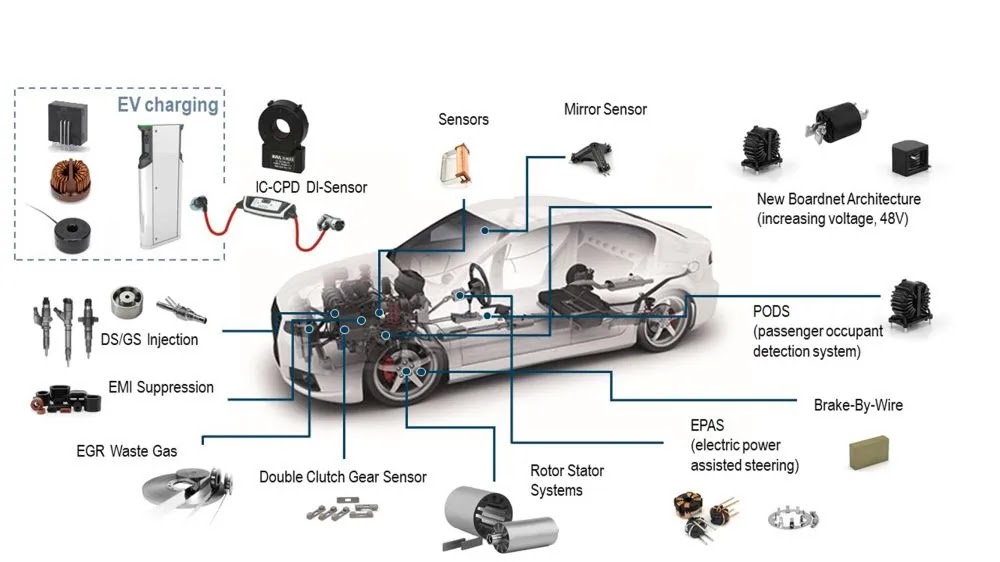In an era of Big Data, when real-time information and advanced connectivity play significant roles in many industries, IoT becomes a key solution, which allows companies to hold the lead. According to IDC, worldwide spending on IoT-powered technologies, in 2022, will grow to $1.2T, at 13.6% CAGR.
As we can see from the numbers above, the world is heading towards higher connectivity. The expansion of “smart devices” on par with digitalisation initiatives will undoubtedly influence every aspect of human lives and catalyze business innovations, thus enabling organizations to stay competitive and keep up with global challenges.
IoT in Electric Vehicles: Getting all Data for Maximum Control
As the concerns on carbon dioxide emission, energy conservation, unsustainable fossil fuels are raising, Electrical Vehicles (EVs) become prevalent all around the world.
As the market grows, the demand for smart charging station rises. Today, most fuelling stations for electrical vehicles are decentralized and have a very complex structure, which means they are hard to manage and maintain for on-site personnel.
EV Charging Stations Challenges
For instance, EV charging stations have to be online all the time, as users charge their cars with an app, but, in case a station suddenly goes offline, it must be fixed as soon as possible. Moreover, data transmission is also a weak point, as needed data are often failed to be timely delivered.
With IoT technology, EV charger stations become smart, connected and hence easily accessible for remote support and maintenance.
EV Charging Analytics for Clients: IoT Powered Apps
Furthermore, with the IoT-powered charging apps, drivers can easily search for a nearby station and schedule a time to fill up.
The app automatically notifies if the station is available and reserve it when needed. Moreover, a great number of factors such as exact charging time, weather conditions that could affect charging times, cable position, etc. are analyzed by the IoT-powered software, so users can access all real-time information about charging processes.
Cloud Platform for EV Charging Management
MSTS. IoT platform can also be a comprehensive solution for complex EV charging station control, usage, and management. MSTS. IoT connects various distributed engineering devices and manages them within one network. The platform applies adjustable cloud architecture – a private, public, or hybrid cloud storage can be deployed as required.
Data collected from various devices are processed and analyzed by advanced data analytics systems and then presented in a user-friendly way. In case of any problems or changes, MSTS. IoT platform immediately informs the right users about an occurred situation. Moreover, an in-built geo-engine allows to easily monitor and manage distributed devices.
Applying MSTS.IoT for EV Charging Stations
MSTS.IoT can also be applied to Electric vehicle (EV) charging stations, making them much smarter. Connecting charging stations, MSTS.IoT offers easier maintenance and management of charging devices and fueling processes via a user-friendly platform. The platform provides collaboration opportunities to station owners, local service providers, global equipment vendors as well as EV drivers.
In an era of Big Data, when real-time information and advanced connectivity play significant roles in many industries, IoT becomes a key solution, which allows companies to hold the lead. According to IDC, worldwide spending on IoT-powered technologies, in 2022, will grow to $1.2T, at 13.6% CAGR.
As we can see from the numbers above, the world is heading towards higher connectivity. The expansion of “smart devices” on par with digitalisation initiatives will undoubtedly influence every aspect of human lives and catalyze business innovations, thus enabling organizations to stay competitive and keep up with global challenges.
IoT in Electric Vehicles: Getting all Data for Maximum Control
As the concerns on carbon dioxide emission, energy conservation, unsustainable fossil fuels are raising, Electrical Vehicles (EVs) become prevalent all around the world.
As the market grows, the demand for smart charging station rises. Today, most fuelling stations for electrical vehicles are decentralized and have a very complex structure, which means they are hard to manage and maintain for on-site personnel.
EV Charging Stations Challenges
For instance, EV charging stations have to be online all the time, as users charge their cars with an app, but, in case a station suddenly goes offline, it must be fixed as soon as possible. Moreover, data transmission is also a weak point, as needed data are often failed to be timely delivered.
With IoT technology, EV charger stations become smart, connected and hence easily accessible for remote support and maintenance.
EV Charging Analytics for Clients: IoT Powered Apps
Furthermore, with the IoT-powered charging apps, drivers can easily search for a nearby station and schedule a time to fill up.
The app automatically notifies if the station is available and reserve it when needed. Moreover, a great number of factors such as exact charging time, weather conditions that could affect charging times, cable position, etc. are analyzed by the IoT-powered software, so users can access all real-time information about charging processes.
Cloud Platform for EV Charging Management
MSTS. IoT platform can also be a comprehensive solution for complex EV charging station control, usage, and management. MSTS. IoT connects various distributed engineering devices and manages them within one network. The platform applies adjustable cloud architecture – a private, public, or hybrid cloud storage can be deployed as required.
Data collected from various devices are processed and analyzed by advanced data analytics systems and then presented in a user-friendly way. In case of any problems or changes, MSTS. IoT platform immediately informs the right users about an occurred situation. Moreover, an in-built geo-engine allows to easily monitor and manage distributed devices.
Applying MSTS.IoT for EV Charging Stations
MSTS.IoT can also be applied to Electric vehicle (EV) charging stations, making them much smarter. Connecting charging stations, MSTS.IoT offers easier maintenance and management of charging devices and fueling processes via a user-friendly platform. The platform provides collaboration opportunities to station owners, local service providers, global equipment vendors as well as EV drivers.























No comments:
Post a Comment